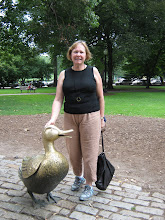


Yom HaShoah is a Jewish holiday, the Jewish day of remembering that 6 million Jews were murdered during the Holocaust, a third of the Jewish population. Something as 'shocking' as the Holocaust is not always easy to share with young children and some would go as far as to say that it is an inappropriate topic for children's books. As a high school student who read The Diary of Anne Frank, I was both appalled and fascinated. I had to read everything. I then read The Upstairs Room and anything else I could find. I read my way through Judith Kerr's series that began with When Hitler Stole Pink Rabbit. I read Esther Hautzig's The Endless Steppe. I am still drawn to books on this topic, having recently read Diane Armstrong's Winter Journey and Nocturne, David Benioff's City of Thieves and John Boyne's The Boy in Striped Pyjamas.
I would use picture books about war with young children, especially in the context of a larger area of enquiry, but I do not expect them to glean everything there is in a book from one reading. Books such as those I will list need to be read, reread, reflected upon and revisited after time. The wonderful thing about 'deep' books is that they can be revisited at different times, at different ages and for different purposes.
Two picture books which deal with the Holocaust by being stories based on real events are A Picture Book of Anne Frank by David A. Adler and The Cats in Krasinski Square by Karen Hesse. The first is biographical narrative that puts Anne's life in a historical context and the second tells of how the people of Warsaw collected cats to put the dogs off the smell of people moving around underground.
Two books that are not biographical, but which deal with issues of life in concentration camps are Don't Forget by Patricia Lakin, where Sarah comes to terms with the numbers tattooed on wrists of older people she interacts with while planning to make a cake for her grandmother, and Let the Celebrations Begin by Margaret Wild where twelve year old Miriam plans to make toys for a special party for the children in the camp as the war is about to end.

No comments:
Post a Comment